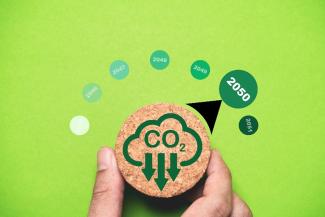Carbon dioxide (CO2) removal (CDR) research — efforts to scale-up and commercialize technologies that will offset so-called hard-to-avoid carbon emissions and remove legacy CO2 from the atmosphere and store it at the gigaton scale — being conducted at NETL will be instrumental in meeting the decarbonization goals of the United States.
In 2022, feeling the impacts of a changing climate in the form of historic droughts and wildfires, the U.S. set ambitious goals: a 50% reduction from 2005 levels in economy-wide net GHG pollution by 2030; a carbon-pollution-free power sector by 2035; and a greenhouse gas (GHG)-neutral “net-zero” economy by 2050. CDR technologies, in combination with steps to reduce current GHG emissions, are keys to reaching those goals.
According to “The Long-Term Strategy of the United States, Pathways to Net-Zero Greenhouse Gas Emissions by 2050,” published by the U.S. Department of State and the U.S. Executive Office of the President, “Modernizing the American economy to achieve net-zero can fundamentally improve the way we live, creating more connected, more accessible, and healthier communities... There will be many challenges on our path to net-zero that will require us to marshal all our ingenuity and dedication.”
The Department of Energy (DOE) was quick to respond with its Carbon Negative Shot, an all-hands-on-deck call for innovations for capturing CO2 from the atmosphere and storing it at gigaton scales for less than $100/net metric ton of CO2-equivalent.
NETL researchers reacted by marshaling their ingenuity and dedication, along with a quarter century of carbon management research and development experience, to address the challenges with the laboratory’s CDR Program — a diverse portfolio of approaches including direct air capture (DAC), biomass carbon removal and storage, marine CDR, and enhanced mineralization.
Permanent storage or conversion of captured CO2 into durable products such as low-carbon concrete is a part of each approach. To quantify benefits of the approaches, NETL is building a suite of robust lifecycle and technoeconomic analysis tools.
DAC, including technologies that separate CO2 from ambient air and deliver it in a pure compressed form for storage or reuse, is a crucial piece of NETL CDR research efforts. There are two main classes of DAC technology. One makes use of solid sorbent materials to capture CO2. The second employs liquid solvents. In either case, the capture material is contacted with ambient air and allowed to capture CO2 and then regenerated with heat or electricity to produce pure CO2.
NETL’s efforts are focused on advancing the CDR goals by accelerating scale-up and commercialization of DAC technology. One portion of this effort includes developing the tools and facilities to support public and private sector partners interested in advancing DAC technology to commercial scale. Another piece involves research to address broad challenges that impact CDR technology such as the degradation of capture materials.
NETL’s DAC Center, under development on its Pittsburgh campus, will provide affordable and accessible performance testing facilities to developers. The center will test emerging technologies that have achieved proof-of-concept but have not yet reached pilot-scale testing. The facility will focus on producing results under realistic operational conditions to facilitate scale-up and deployment.
Researchers are also engaged in efforts to better understand the degradation of capture materials. Amines are a class of materials which are common to both solvent and sorbent capture applications. Unfortunately, these materials are vulnerable to oxidation, which, over time, can result in reduced effectiveness in CO2 capture and the possible emission of toxic byproducts. By improving understanding of the mechanisms of this degradation, NETL researchers will be able to ensure better, safer DAC implementation and reduced the needed time for testing new materials.
NETL is a DOE national laboratory that drives innovation and delivers solutions for an environmentally sustainable and prosperous energy future. By using its world-class talent and research facilities, NETL is ensuring affordable, abundant and reliable energy that drives a robust economy and national security, while developing technologies to manage carbon across the full life cycle, enabling environmental sustainability for all Americans.




